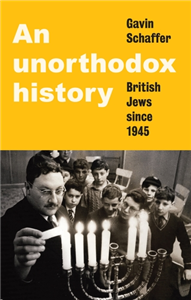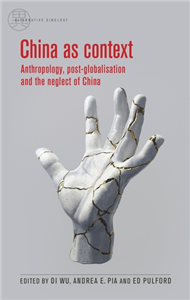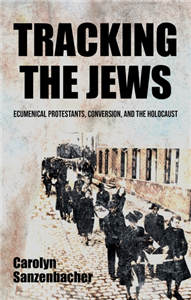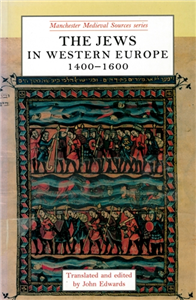Your Search Results
-
AITBS Publishers India
We are one of the leading publishers in India dealing in more than 400 titles. We are well reputed for publishing quality books mainly in Medical, Nursing, Pharmacy, Dentistry, Dictionaries, Management, Economics, Mathematics, Engineering and English Literature. We have published many good books authored by learned and eminent Indian authors. We sell and purchase reprint rights. Our aim is to publish good books, useful for students, colleges, professional institutes and public libraries.
View Rights Portal
-
Promoted ContentHumanities & Social SciencesJanuary 2013
The Jews in western Europe, 1400–1600
by John Edwards
As European politics, society, economy and religion underwent epoch-making changes between 1400 and 1600, the treatment of Europe's Jews by the non-Jewish majority was, then as in later periods, a symptom of social problems and tensions in the Continent as a whole. Through a broad-ranging collection of documents, John Edwards sets out to present a vivid picture of the Jewish presence in European life during this vital and turbulent period. Subjects covered include the Jews' own economic presence and culture, social relations between Jews and Christians, the policies and actions of Christian authorities in Church and State. He also draws upon original source material to convey ordinary people's prejudices about Jews, including myths about Jewish 'devilishness', money-grabbing, and 'ritual murder' of Christian children. Full introductory and explanatory material makes accessible the historical context of the subject and highlights the insights offered by the documents as well as the pitfalls to be avoided in this area of historical enquiry. This volume aims to provide a coherent working collection of texts for lecturers, teachers and students who wish to understand the experience of Jewish Europeans in this period.
-
Promoted ContentHumanities & Social SciencesMarch 2017
'The better class' of Indians
Social rank, Imperial identity, and South Asians in Britain 1858–1914
by A. Wainwright
This is the first book-length study to focus primarily on the role of class in the encounter between South Asians and British institutions in the United Kingdom at the height of British imperialism. In a departure from previous scholarship on the South Asian presence in Britain, 'The better class' of Indians emphasizes the importance of class as the register through which British polite society interpreted other social distinctions such as race, gender, and religion. Drawing mainly on unpublished material from the India Office Records, the National Archives, and private collections of charitable organizations, this book examines not only the attitudes of British officials towards South Asians in their midst, but also the actual application of these attitudes in decisions pertaining to them. This fascinating book will be of particular interest to scholars and general readers of imperialism, immigration as well as British and Indian social history.
-
 Trusted Partner
The ArtsJanuary 2026
Trusted Partner
The ArtsJanuary 2026David Simon's American City
by Mikkel Jensen
This book examines the television serials created by influential showrunner David Simon. The book argues that Simon's main theme is the state of the contemporary American city and that all of his serials (barring one about the Iraq War) explore different facets of the metropolis. Each series offers distinctly different visions of the American city, but taken together they represent a sustained and intricate exploration of urban problems in modern America. From deindustrialisation in The Wire and residential segregation in Show Me a Hero to post-Katrina New Orleans in Treme and the transformation of the urban core in The Deuce, David Simon's American city traces the urban through-line in Simon's body of work. Based on sustained analysis of these serials and their engagement with contemporary politics and culture, David Simon's American city offers a compelling examination of one of television's most arresting voices.
-
 Trusted Partner
Literature & Literary StudiesJune 2023
Trusted Partner
Literature & Literary StudiesJune 2023The politics of male friendship in contemporary American fiction
by Michael Kalisch
How might our friendships shape our politics? This book examines how contemporary American fiction has rediscovered the concept of civic friendship and revived a long tradition of imagining male friendship as interlinked with the promises and paradoxes of democracy in the United States. Bringing into dialogue the work of a wide range of authors - including Philip Roth, Paul Auster, Michael Chabon, Jonathan Lethem, Dinaw Mengestu, and Teju Cole - this innovative study advances a compelling new account of the political and intellectual fabric of the American novel today.
-
 Trusted Partner
Humanities & Social SciencesFebruary 2025
Trusted Partner
Humanities & Social SciencesFebruary 2025An unorthodox history
British Jews since 1945
by Gavin Schaffer
A bold, new history of British Jewish life since the Second World War. Historian Gavin Schaffer wrestles Jewish history away from the question of what others have thought about Jews, focusing instead on the experiences of Jewish people themselves. Exploring the complexities of inclusion and exclusion, he shines a light on groups that have been marginalised within Jewish history and culture, such as queer Jews, Jews married to non-Jews, Israel-critical Jews and even Messianic Jews, while offering a fresh look at Jewish activism, Jewish religiosity and Zionism. Weaving these stories together, Schaffer argues that there are good reasons to consider Jewish Britons as a unitary whole, even as debates rage about who is entitled to call themselves a Jew. Challenging the idea that British Jewish life is in terminal decline. An unorthodox history demonstrates that Jewish Britain is thriving and that Jewishness is deeply embedded in the country's history and culture.
-
 Trusted Partner
Humanities & Social SciencesFebruary 2017
Trusted Partner
Humanities & Social SciencesFebruary 2017Servants of the empire
The Irish in Punjab 1881–1921
by Patrick O'Leary, Andrew Thompson, John M. MacKenzie
Punjab, 'the pride of British India', attracted the cream of the Indian Civil Service, many of the most influential of whom were Irish. Some of these men, along with Irish viceroys, were inspired by their Irish backgrounds to ensure security of tenure for the Punjabi peasant, besides developing vast irrigation schemes which resulted in the province becoming India's most affluent. But similar inspiration contributed to the severity of measures taken against Indian nationalist dissent, culminating in the Amritsar massacre which so catastrophically transformed politics on the sub-continent. Setting the experiences of Irish public servants in Punjab in the context of the Irish diaspora and of linked agrarian problems in Ireland and India, this book descrides the beneficial effects the Irish had on the prosperity of India's most volatile province. Alongside the baleful contribution of some towards a growing Indian antipathy towards British rule. Links are established between policies pursued by Irishmen of the Victorian era and current happenings on the Pakistan-Afghan border and in Punjab.
-
 Trusted Partner
Humanities & Social SciencesMarch 2017
Trusted Partner
Humanities & Social SciencesMarch 2017New frontiers
Imperialism's new communities in East Asia, 1842–1953
by Robert Bickers, Christian Henriot
In the new world order mapped out by Japanese and Western imperialism in East Asia after the mid-nineteenth century opium wars, communities of merchants and settlers took root in China and Korea. New identities were constructed, new modes of collaboration formed and new boundaries between the indigenous and foreign communities were literally and figuratively established. Newly available in paperback, this pioneering and comparative study of Western and Japanese imperialism examines European, American and Japanese communities in China and Korea, and challenges received notions of agency and collaboration by also looking at the roles in China of British and Japanese colonial subjects from Korea, Taiwan and India, and at Chinese Christians and White Russian refugees. This volume will be of interest to students and scholars of the history and anthropology of imperialism, colonialism's culture and East Asian history, as well as contemporary Asian affairs.
-
 Trusted Partner
Trusted Partner
-
 Trusted Partner
Humanities & Social SciencesSeptember 2025
Trusted Partner
Humanities & Social SciencesSeptember 2025China as context
Anthropology, post-globalisation and the neglect of China
by Di Wu, Andrea E. Pia, Ed Pulford
Decades-old calls to promote the significance of China for anthropological theory and the social sciences more generally ring more urgently today given China's importance to social, political and economic life globally. Yet Chinese-grounded ideas remain marginal to the discipline, and scholarly discussions retain a sense of China as an 'Other' apart from the 'real' world, and thus unsuitable or generating widely applicable theoretical ideas. Inspired by East Asian postcolonial scholarship, this volume tackles this unsettling situation head-on, arguing that without taking China seriously as a powerful agent, a locus of knowledge production, and a new discursive topos of an emerging post-global imaginary, anthropologists and other social scientists may fail to adequately analyse the global present and make sense of both the material and immaterial forces that animate it, wherever and however they work. Amid the end of Western globalisation and shifting anthropological understandings of relations between ethnography and theory, we show how 'China' must be understood as the ordinary 'context' for anthropological research practices worldwide.
-
 Trusted Partner
Humanities & Social SciencesApril 2024
Trusted Partner
Humanities & Social SciencesApril 2024Tracking the Jews
Ecumenical Protestants, conversion, and the Holocaust
by Carolyn Sanzenbacher
This book sheds light on an unprecedented Protestant conversion initiative for the global evangelisation of Jews. Founded in 1929, the International Committee on the Christian Approach to the Jews (ICCAJ) aimed to bring Jewish people to their 'spiritual destiny', a task it saw as both benevolent and essential for a harmonious society. By the time of Hitler's rise to power it was active in thirty-two countries, educating Protestant churches on the right Christian attitude towards Jews and antisemitism. Reconstructing the activities of the ICCAJ in the years before, during and immediately after the Holocaust, Tracking the Jews reveals how ideas disseminated through the organisation's discourse - 'Jewish problem', 'Jewish influence', 'Judaising threat', 'eternal Jew' - were used to rationalise, justify, explain or advance a number of deeply troubling policies. They were, for vastly different reasons, consciously used elements of argumentation in both Protestant conversionary discourse and Nazi antisemitic ideology.
-
 Trusted Partner
Literature & Literary StudiesMarch 2022
Trusted Partner
Literature & Literary StudiesMarch 2022The quiet contemporary American novel
by Rachel Sykes, Sharon Monteith
-
 Trusted Partner
Literature & Literary StudiesJuly 2021
Trusted Partner
Literature & Literary StudiesJuly 2021The politics of male friendship in contemporary American fiction
by Michael Kalisch, Sharon Monteith, Nahem Yousaf
-
 Trusted Partner
The ArtsJanuary 2099
Trusted Partner
The ArtsJanuary 2099David Simon's American city
by Mikkel Jensen, Jonathan Bignell, Sarah Cardwell
-
 Trusted Partner
Humanities & Social SciencesFebruary 2020
Trusted Partner
Humanities & Social SciencesFebruary 2020Jews on trial
The Papal Inquisition in Modena, 1598–1638
by Joseph Bergin, Katherine Aron-Beller, Penny Roberts, William G. Naphy
Jews on trial concentrates on Inquisitorial activity during the period which historians have argued was the most active in the Inquisition's history: the first forty years of the tribunal in Modena, from 1598 to 1638, the year of the Jews' enclosure in the ghetto. Scholars have in the past tended to group trials of Jews and conversos in Italy together. This book emphasises the fundamental disparity in Inquisitorial procedure, as well as the evidence examined, and argues that this was especially true in Modena where the secular authority did not have the power during the period in question to reject, or even significantly monitor, Inquisitorial trial procedure. It draws upon the detailed testimony to be found in trial transcripts to analyse Jewish interaction with Christian society in an early modern community. This book will appeal to scholars of inquisitorial studies, social and cultural interaction in early modern Europe, Jewish Italian social history and anti-Semitism.
-
 Trusted Partner
December 2023
Trusted Partner
December 2023Hatred of Jews
A never-ending story?
by Sebastian Voigt
— An overall presentation of the history of anti-Semitism based on the latest research — A necessary book that helps to recognise (and combat) anti-Jewish attitudes and patterns of behaviour even in the present day The Hamas attack on Israel is further aggravating the situation in the Middle East, and will continue to intensify anti-Semitism. And this plague, combined with Israel’s denied right to exist; the attacks in Brussels and Paris; the aggressive violence against everything Jewish in the Islamic world – is as dangerous as ever. Hatred of the Jews is old, vast and strong. The anamnesis began 2500 years ago in the Middle Ages, and came to head in the 18th and 19th centuries. It culminated ideologically in the Wannsee Conference, and became murderous in Auschwitz. Historian Sebastian Voigt provides a dense history of the hatred of the Jews – and combines it with a passionate call for courageous resistance.
-
 Trusted Partner
Humanities & Social SciencesMarch 2017
Trusted Partner
Humanities & Social SciencesMarch 2017Silk and empire
by Brenda King
In this book, Brenda M. King challenges the notion that Britain always exploited its empire. Creativity, innovation and entrepreneurship were all part of the Anglo-Indian silk trade and were nurtured in the era of empire through mutually beneficial collaboration. The trade operated within and without the empire, according to its own dictates and prospered in the face of increasing competition from China and Japan. King presents a new picture of the trade, where the strong links between Indian designs, the English silk industry and prominent members of the English the arts and crafts movement led to the production of beautiful and luxurious textiles. Lavishly illustrated, this book will be of interest to those interested in the relationship between the British Empire and the Indian subcontinent, as well as by historians of textiles and fashion.
-
 Trusted Partner
Humanities & Social SciencesMarch 2017
Trusted Partner
Humanities & Social SciencesMarch 2017The language of empire
Myths and metaphors of popular imperialism, 1880-1918
by Robert Macdonald
The debate about the Empire dealt in idealism and morality, and both sides employed the language of feeling, and frequently argued their case in dramatic terms. This book opposes two sides of the Empire, first, as it was presented to the public in Britain, and second, as it was experienced or imagined by its subjects abroad. British imperialism was nurtured by such upper middle-class institutions as the public schools, the wardrooms and officers' messes, and the conservative press. The attitudes of 1916 can best be recovered through a reconstruction of a poetics of popular imperialism. The case-study of Rhodesia demonstrates the almost instant application of myth and sign to a contemporary imperial crisis. Rudyard Kipling was acknowledged throughout the English-speaking world not only as a wonderful teller of stories but as the 'singer of Greater Britain', or, as 'the Laureate of Empire'. In the last two decades of the nineteenth century, the Empire gained a beachhead in the classroom, particularly in the coupling of geography and history. The Island Story underlined that stories of heroic soldiers and 'fights for the flag' were easier for teachers to present to children than lessons in morality, or abstractions about liberty and responsible government. The Education Act of 1870 had created a need for standard readers in schools; readers designed to teach boys and girls to be useful citizens. The Indian Mutiny was the supreme test of the imperial conscience, a measure of the morality of the 'master-nation'.
-
 Trusted Partner
Humanities & Social SciencesFebruary 2013
Trusted Partner
Humanities & Social SciencesFebruary 2013The Jews in western Europe, 1400–1600
by Translated and Edited by John Edwards
As European politics, society, economy and religion underwent epoch-making changes between 1400 and 1600, the treatment of Europe's Jews by the non-Jewish majority was, then as in later periods, a symptom of social problems and tensions in the Continent as a whole. Through a broad-ranging collection of documents, John Edwards sets out to present a vivid picture of the Jewish presence in European life during this vital and turbulent period. Subjects covered include the Jews' own economic presence and culture, social relations between Jews and Christians, the policies and actions of Christian authorities in Church and State. He also draws upon original source material to convey ordinary people's prejudices about Jews, including myths about Jewish 'devilishness', money-grabbing, and 'ritual murder' of Christian children. Full introductory and explanatory material makes accessible the historical context of the subject and highlights the insights offered by the documents as well as the pitfalls to be avoided in this area of historical enquiry. This volume aims to provide a coherent working collection of texts for lecturers, teachers and students who wish to understand the experience of Jewish Europeans in this period. ;
-
 Trusted Partner
Literature & Literary StudiesOctober 2023
Trusted Partner
Literature & Literary StudiesOctober 2023Reading David Foster Wallace between philosophy and literature
by Allard den Dulk, Pia Masiero, Adriano Ardovino
-
 Trusted Partner
Trusted Partner























